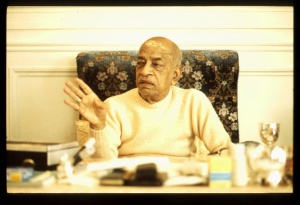CC Madhya 9.262: Difference between revisions
m (1 revision(s)) |
No edit summary |
||
| Line 1: | Line 1: | ||
{{ | [[Category:Sri Caitanya-caritamrta - Madhya-lila Chapter 09|C262]] | ||
<div style="float:left">'''[[Sri Caitanya-caritamrta|Śrī Caitanya-caritāmṛta]] - [[CC Madhya|Madhya-līlā]] - [[CC Madhya 9|Chapter 9: Lord Śrī Caitanya Mahāprabhu's Travels to the Holy Places]]'''</div> | |||
<div style="float:right">[[File:Go-previous.png|link=CC Madhya 9.261|Madhya-līlā 9.261]] '''[[CC Madhya 9.261|Madhya-līlā 9.261]] - [[CC Madhya 9.263|Madhya-līlā 9.263]]''' [[File:Go-next.png|link=CC Madhya 9.263|Madhya-līlā 9.263]]</div> | |||
{{CompareVersions|CC|Madhya 9.262|CC 1975|CC 1996}} | |||
{{RandomImage}} | |||
==== TEXT 262 ==== | ==== TEXT 262 ==== | ||
<div | <div class="verse"> | ||
evaṁ-vrataḥ sva-priya-nāma-kīrtyā | :evaṁ-vrataḥ sva-priya-nāma-kīrtyā | ||
jātānurāgo druta-citta uccaiḥ | :jātānurāgo druta-citta uccaiḥ | ||
hasaty atho roditi rauti gāyaty | :hasaty atho roditi rauti gāyaty | ||
unmāda-van nṛtyati loka-bāhyaḥ | :unmāda-van nṛtyati loka-bāhyaḥ | ||
</div> | </div> | ||
| Line 14: | Line 18: | ||
==== SYNONYMS ==== | ==== SYNONYMS ==== | ||
<div | <div class="synonyms"> | ||
evam- | ''evam-vrataḥ''—when one thus engages in a vow to chant and dance; ''sva''—own; ''priya''—very dear; ''nāma''—holy name; ''kīrtyā''—by chanting; ''jāta''—in this way develops; ''anurāgaḥ''—attachment; ''druta-cittaḥ''—very eagerly; ''uccaiḥ''—loudly; ''hasati''—laughs; ''atho''—also; ''roditi''—cries; ''rauti''—becomes agitated; ''gāyati''—chants; ''unmāda-vat''—like a madman; ''nṛtyati''—dances; ''loka-bāhyaḥ''—without caring for outsiders. | ||
</div> | </div> | ||
| Line 21: | Line 25: | ||
==== TRANSLATION ==== | ==== TRANSLATION ==== | ||
<div | <div class="translation"> | ||
“‘When a person is actually advanced and takes pleasure in chanting the holy name of the Lord, who is very dear to him, he is agitated and loudly chants the holy name. He also laughs, cries, becomes agitated and chants just like a madman, not caring for outsiders.’ | “‘When a person is actually advanced and takes pleasure in chanting the holy name of the Lord, who is very dear to him, he is agitated and loudly chants the holy name. He also laughs, cries, becomes agitated and chants just like a madman, not caring for outsiders.’ | ||
</div> | </div> | ||
| Line 28: | Line 32: | ||
==== PURPORT ==== | ==== PURPORT ==== | ||
<div | <div class="purport"> | ||
This verse is a quotation from Śrīmad-Bhāgavatam ([[SB 11.2.40]]). | This verse is a quotation from [[Srimad-Bhagavatam|''Śrīmad-Bhāgavatam'']] ([[SB 11.2.40]]). | ||
</div> | </div> | ||
__NOTOC__ | |||
<div style="float:right; clear:both;">[[File:Go-previous.png|link=CC Madhya 9.261|Madhya-līlā 9.261]] '''[[CC Madhya 9.261|Madhya-līlā 9.261]] - [[CC Madhya 9.263|Madhya-līlā 9.263]]''' [[File:Go-next.png|link=CC Madhya 9.263|Madhya-līlā 9.263]]</div> | |||
__NOTOC__ | |||
__NOEDITSECTION__ | |||
Revision as of 12:18, 27 August 2021

A.C. Bhaktivedanta Swami Prabhupada
TEXT 262
- evaṁ-vrataḥ sva-priya-nāma-kīrtyā
- jātānurāgo druta-citta uccaiḥ
- hasaty atho roditi rauti gāyaty
- unmāda-van nṛtyati loka-bāhyaḥ
SYNONYMS
evam-vrataḥ—when one thus engages in a vow to chant and dance; sva—own; priya—very dear; nāma—holy name; kīrtyā—by chanting; jāta—in this way develops; anurāgaḥ—attachment; druta-cittaḥ—very eagerly; uccaiḥ—loudly; hasati—laughs; atho—also; roditi—cries; rauti—becomes agitated; gāyati—chants; unmāda-vat—like a madman; nṛtyati—dances; loka-bāhyaḥ—without caring for outsiders.
TRANSLATION
“‘When a person is actually advanced and takes pleasure in chanting the holy name of the Lord, who is very dear to him, he is agitated and loudly chants the holy name. He also laughs, cries, becomes agitated and chants just like a madman, not caring for outsiders.’
PURPORT
This verse is a quotation from Śrīmad-Bhāgavatam (SB 11.2.40).